Opinion: The home console-mobile hybrid is the future of gaming
Let’s get epic for a moment

Over recent weeks, Epic Games president Mike Capps has been inciting the wrath of console gamers and journalists alike by suggesting that mobile phones are “where the gamers are going.”
Before I explain why Capp's comments may not be quite as far-fetched as you think, let’s give some space to everybody's initial reaction to them: “Bollocks”.
Home vs AwayAfter all, home consoles have dedicated controls that easily trump the touchscreen when it comes to response time and accuracy for nearly all of the established genres.
Moreover, while great strides have been made in addressing the hunger for so-called ‘core’ gaming (which can be loosely defined as FPS, RPG, driving, and sports), it’s hard to disagree that these games are significantly poorer on iPhone than on consoles, both in terms of graphics and depth of gameplay.
Apologists will point to titles like Dead Space and Final Fantasy Tactics as proof of the iPhone’s core appeal, but I’d like to remind said gamers that the former is a short spin-off from the console version, while the latter is a port of a 14-year-old PlayStation game (via PlayStation Portable).
They’re hardly Black Ops.
In short, mobile gaming can’t replace the console experience right now, either through content or through hardware.
But that’s not what Epic’s comments are about.
To understand what Mike Capps means, we need to take a look at the emerging technologies that have begun to appear on the top-of-the-line mobiles, and what opportunities they offer.
The future is nowOf primary interest is the growing trend for phones to output their display via HDMI or, in the case of Apple devices, streaming remotely via AppleTV.
Because the resolution of the screens and the relative power of the processors are increasing at such a fast rate, it’s now possible on the very latest devices like the iPad 2 to stream smooth 60fps 720p images directly, and it’s likely we won’t have to wait too long before we see quad-core processors doing the same for 1080p.
Naturally, the current polygon count is relatively low, but advances in mobile tech appear to be faster than at any other point in computing - it took a year for CPU speeds to double during the '90s, while the Tegra 3 quad-core was announced the same month the dual-core devices went on sale.
So we can be sure that mobile tech will eventually reach the power of home consoles today. But that doesn’t resolve the control issues - touchscreens just aren’t as good as dedicated controllers.
But why on earth would you need to use the touchscreen at home? Picture it - you get back from work, plonk the mobile on the coffee table, turn on the TV, and fish out your Bluetooth controller from the dusty space where that bulky Xbox 360 once sat.
The game console is your mobile - either streaming or passing the image via the HDMI - so there’s no need for a clunky box to sit there doing the legwork if the phone has enough power.
The future will be better tomorrowSo there we go. Everyone gets to play FIFA at home without compromise, and maybe they even shuffle around their teams on the bus while they’re away from the telly.
Problem solved.
Alas, not quite. Every time graphics step up, so too does the cost of producing the game itself, and this could spell trouble on the exclusively budget-priced App Store.
Given the response to the recent $15 price tag of Final Fantasy Tactics, and the proliferation of freemium apps, it’s very tempting to say that mobile gamers just aren’t willing to pay over a few dollars / pounds for a big release.
But, then again, when the expensive games being released are either cut-down versions of the real things or old ports, is it really a surprise that mobile gamers feel the games they play are worth less?
As Michael Schade from Fishlabs (Galaxy on Fire 2) says, "Quality comes at a price”.
If console-quality releases like Call of Duty were being released - with no edits or alterations - for a mobile / console hybrid, what is there to suggest people wouldn’t be willing to pay at least twice as much than the current ‘cut-off point’ in pricing on the App Store?
There are many questions that need to be answered before this convergent gaming future gains root - from pricing and battery life to storage - as well as other competing ideas for a non-console future that are just as compelling (such as Cloud gaming from OnLive and Gaikai).
But one thing's for sure: gaming is evolving, and the iconic machines of the past aren't necessarily the templates for the future.
